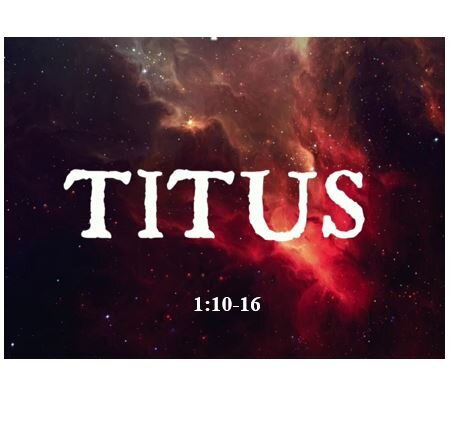BIG IDEA:
REPROVE REBELLIOUS TROUBLEMAKERS WHO SUBVERT SOUND DOCTRINE AND DENY GOD BY THEIR DEEDS
I. (:10-11) SILENCE THE FALSE TEACHERS
Key: “who must be silenced”
Hendriksen: “Paul uses a rare verb which has as its primary meaning ‘to stop the mouth by means of a bridle, muzzle, or gag.’ The deceivers, then must not be tolerated but be silenced, and this should be done by Titus and by the elders…”
A. Their Number — “For there are many”
B. Their Character — “rebellious men”
refusing to submit to any authority
C. Their Methodology and Results
1. “empty talkers”
2. “deceivers”
Hendriksen: “achieving no useful purpose, with their fictitious tales about Adam, Moses, Elijah, etc., and with their legalistic hair-splitting (cf. 1 Tim. 1:6); yet deceiving the minds of the weak.”
D. Their Primary Background — “especially those of the circumcision”
E. Their Disruptive Impact — “because they are upsetting whole families”
Bassler: “The picture that emerges is one of a somewhat less than cohesive church structure in which a lot of the teaching activity takes place in various households.”
Hendriksen: “In the church of God there is no such thing as ‘freedom of misleading speech.’ Reason: it would be too dangerous.”
F. Their Message — “teaching things they should not teach”
G. Their Motivation — “for the sake of sordid gain”
II. (:12-14) RESCUE THE GULLIBLE
A. (:12-13A) This Problem of False Teaching in Crete Should be no Surprise —
Once you understand both:
– the character of the false teachers
– the susceptibility of the people to error
2 or 3 different groups in view here — false teachers inside the church who were possibly true believers and needed correction; false teachers either inside or outside the church who were false professors of faith with a strong Jewish background; and those gullible church members who were being unduly influenced away from the faith
1. Confirmed by their Own Testimony
“One of themselves, a prophet of their own, said”
Paul not speaking in some type of harsh, judgmental spirit
2. Character of the False Teachers (and to a lesser extent of the Gullible People)
a. “Cretans are always liars”
explains how they can embrace a false message
b. “evil beasts”
explains how they can exert such an evil, disruptive influence
c. “lazy gluttons”
explains their motivation of seeking to profit by attracting a following
3. Validity of this Testimony — “This testimony is true”
B. (:13B-14) Necessity for Correction in order to Rescue the Gullible
1. Confrontation — “Reprove them severely”
2. Goal — “that they may be sound in the faith”
Kent: “Some broaden the scope of ‘they’ (subject of the verb ‘be healthy’) to include not just the false teachers, but the victims of their teaching as well.”
“the faith” = the body of truth that is in accordance with sound doctrine
3. Warning Against Distractions and Disruptive Influences
a. “not paying attention to Jewish myths”
b. “and commandments of men who turn away from the truth”
III. (:15-16) DISCERN THE FALSE FROM THE TRUE — LOOK AT THEIR DEEDS
Two Contrasts presented:
A. (:15) Contrast Between Pure and Defiled
1. “To the pure, all things are pure”
2. “but to those who are defiled and unbelieving, nothing is pure”
3. Total Depravity — Pervasive Defilement
a. “but both their mind”
b. “and their conscience are defiled”
Bassler: “… instead of becoming or keeping themselves pure by eating only pure things, the very fact that they consider anything impure and therefore need regulations for their own purity is the demonstration that the false teachers are themselves defiled. They are so precisely because they are also unbelieving, that is, not putting their trust in Christ. Thus in the new Age, everything is new. The one who seeks purity by obedience to regulations, that is, human commandments, turns out not to be one of God’s people at all, but among the unbelieving.”
Hiebert: “A moral perversion has taken place in their whole being. Their ‘minds,’ their rational nature enabling them to think and reflect on thiings moral and spiritual, have become polluted, and their conscience has lost its ability to make correct moral judgments, leaving them unable to make true distinctions between good and evil.”
B. (:16) Contrast Between False Profession of Faith and Lack of Good Deeds
1. False Profession of Faith — “They profess to know God”
2. Practical Denial — “but by their deeds they deny Him”
3. Total Depravity — Void of Good Deeds
a. “being detestable”
b. “and disobedient”
c. “and worthless for any good deed”
Hiebert: “The false teachers also stand condemned by the test of conduct. They publicly confess that they ‘know God,’ are fully informed about him, and stand in intimate relations with him. (‘God’ is emphatic by position.) The claim may be pride in assumed Jewish religious privilege or an expression of the Gnostic claim to an esoteric knowledge of God.”

